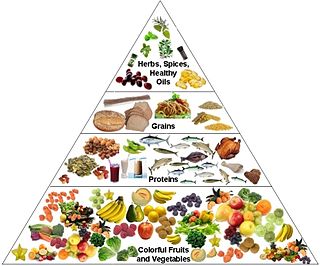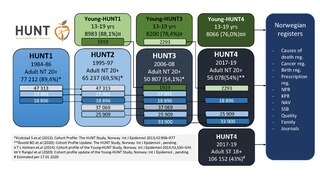Cohorts
The Rotterdam Study comprises of three cohorts.
The initial cohort (RS-I) started out in 1990 with 7,983 men and women aged 55 years and over. Follow-up visits were held in 1993–1995, in 1997–1999, 2002–2004, 2009–2011, and 2014-2015.
In 2000 a second cohort was established (RS-II). Another 3,011 inhabitants of Ommoord aged 55 years and over agreed to participate. The participants of this second cohort visited the research center for a follow-up examinations in 2004-2005, 2011–2012, and 2015-2016.
The third cohort of the Rotterdam Study (RS-III) started in 2006, this time with inhabitants aged 45 years and over. Inclusion ended in December 2008 and 3,932 participants have been included in this third cohort. The first follow-up examinations were held in 2012-2014. [1]

Epidemiology is the study and analysis of the distribution, patterns and determinants of health and disease conditions in defined population.
A cohort study is a particular form of longitudinal study that samples a cohort, performing a cross-section at intervals through time. It is a type of panel study where the individuals in the panel share a common characteristic.

A multivitamin is a preparation intended to serve as a dietary supplement with vitamins, dietary minerals, and other nutritional elements. Such preparations are available in the form of tablets, capsules, pastilles, powders, liquids, or injectable formulations. Other than injectable formulations, which are only available and administered under medical supervision, multivitamins are recognized by the Codex Alimentarius Commission as a category of food.

The Women's Health Initiative (WHI) was a series of clinical studies initiated by the U.S. National Institutes of Health (NIH) in 1991, to address major health issues causing morbidity and mortality in postmenopausal women. It consisted of three clinical trials (CT) and an observational study (OS). In particular, randomized controlled trials were designed and funded that addressed cardiovascular disease, cancer, and osteoporosis.
The Framingham Heart Study is a long-term, ongoing cardiovascular cohort study of residents of the city of Framingham, Massachusetts. The study began in 1948 with 5,209 adult subjects from Framingham, and is now on its third generation of participants. Prior to the study almost nothing was known about the epidemiology of hypertensive or arteriosclerotic cardiovascular disease. Much of the now-common knowledge concerning heart disease, such as the effects of diet, exercise, and common medications such as aspirin, is based on this longitudinal study. It is a project of the National Heart, Lung, and Blood Institute, in collaboration with Boston University. Various health professionals from the hospitals and universities of Greater Boston staff the project.

Erasmus University Rotterdam is a public research university located in Rotterdam, Netherlands. The university is named after Desiderius Erasmus Roterodamus, a 15th-century humanist and theologian.
The Whitehall Studies investigated social determinants of health, specifically the cardiovascular disease prevalence and mortality rates among British civil servants. The initial prospective cohort study, the Whitehall I Study, examined over 17,500 male civil servants between the ages of 20 and 64, and was conducted over a period of ten years, beginning in 1967. A second cohort study, the Whitehall II Study, was conducted from 1985 to 1988 and examined the health of 10,308 civil servants aged 35 to 55, of whom two thirds were men and one third women. A long-term follow-up of study subjects from the first two phases is ongoing.
The Women's Interagency HIV Study (WIHS) was established in August 1993 to investigate the impact and progression of HIV disease in women. The WIHS enrolls both HIV-positive and HIV-negative women. The core portion of the study includes a detailed and structured interview, physical and gynecologic examination, and laboratory testing. The WIHS participants are also asked to enroll in various sub-studies, such as cardiovascular, metabolic, musculoskeletal, and neurocognition. New proposals for WIHS sub-studies are submitted for approval by various scientific investigators from around the world.

A prospective cohort study is a longitudinal cohort study that follows over time a group of similar individuals (cohorts) who differ with respect to certain factors under study, to determine how these factors affect rates of a certain outcome. For example, one might follow a cohort of middle-aged truck drivers who vary in terms of smoking habits, to test the hypothesis that the 20-year incidence rate of lung cancer will be highest among heavy smokers, followed by moderate smokers, and then nonsmokers.
Cognitive epidemiology is a field of research that examines the associations between intelligence test scores and health, more specifically morbidity and mortality. Typically, test scores are obtained at an early age, and compared to later morbidity and mortality. In addition to exploring and establishing these associations, cognitive epidemiology seeks to understand causal relationships between intelligence and health outcomes. Researchers in the field argue that intelligence measured at an early age is an important predictor of later health and mortality differences.

Nutritional epidemiology examines dietary and nutritional factors in relation to disease occurrence at a population level. Nutritional epidemiology is a relatively new field of medical research that studies the relationship between nutrition and health. It is a young discipline in epidemiology that is continuing to grow in relevance to present-day health concerns. Diet and physical activity are difficult to measure accurately, which may partly explain why nutrition has received less attention than other risk factors for disease in epidemiology. Nutritional epidemiology uses knowledge from nutritional science to aid in the understanding of human nutrition and the explanation of basic underlying mechanisms. Nutritional science information is also used in the development of nutritional epidemiological studies and interventions including clinical, case-control and cohort studies. Nutritional epidemiological methods have been developed to study the relationship between diet and disease. Findings from these studies impact public health as they guide the development of dietary recommendations including those tailored specifically for the prevention of certain diseases, conditions and cancers. It is argued by western researchers that nutritional epidemiology should be a core component in the training of all health and social service professions because of its increasing relevance and past successes in improving the health of the public worldwide. However, it is also argued that nutritional epidemiological studies yield unreliable findings as they rely on the role of diet in health and disease, which is known as an exposure that is susceptible to considerable measurement error.

The Trøndelag Health Study is a cohort health study performed in the Norwegian county of Trøndelag. HUNT is considered one of the most extensive cohort studies ever conducted in any country. The HUNT Research Centre, which is responsible for collecting and providing access to the data and samples from the study, is part of the Faculty of Medicine and Health Sciences at the Norwegian University of Science and Technology (NTNU).
CARTaGENE is a population based cohort based on an ongoing and long-term health study of 40, 000 men and women in Québec. It is a regional cohort member of the Canadian Partnership for Tomorrow's Health (CanPath). The project's core mandate is to identify the genetic and environmental causes of common chronic diseases affecting the Québec population. The overall objective from a public health perspective is to develop personalized medicine and public policy initiatives targeting high-risk groups. CARTaGENE is under the scientific direction of Sébastien Jacquemont, M.D., Ekaterini Kritikou, Ph.D. and Philippe Broët, M.D. Ph.D., of the Sainte-Justine Children's Hospital University Health Center. Based in Montréal Québec, Canada, CARTaGENE is operated under the infrastructure of the Sainte-Justine Children's Hospital University Health Center and has seen funding from Genome Canada, the Canadian Foundation for Innovation and Génome Québec and the Canadian Partnership Against Cancer (CPAC) since 2007 among other sources. The program was initially founded by Professors Claude Laberge and Bartha Knoppers, and developed through two phases of participant recruitment under the direction of Professor Philip Awadalla as Scientific Director of the cohort from 2009 to 2015, who is now the National Scientific Director of the Canadian Partnership for Tomorrow's Health (CanPath).

The Caerphilly Heart Disease Study, also known as the Caerphilly Prospective Study (CaPS), is an epidemiological prospective cohort, set up in 1979 in a representative population sample drawn from Caerphilly, a typical small town in South Wales, UK.
Generation R is a prospective, population based cohort study from fetal life until young adulthood in a multi-ethnic urban population in Rotterdam, the Netherlands. The study is designed to identify early environmental and genetic causes of normal and abnormal growth, development and health. Eventually, results forthcoming from the Generation R Study have to contribute to the development of strategies for optimizing health and healthcare for pregnant women and children.
Monique Maria Bernadette Breteler is a Dutch neuroepidemiologist. She is Director of Population Health Sciences at the German Center for Neurodegenerative Diseases (DZNE), Professor of Population Health Sciences at the University of Bonn, and Adjunct Professor of Epidemiology at the Harvard School of Public Health in Boston, Massachusetts. She has been a foreign member of the Royal Netherlands Academy of Arts and Sciences since 2015.
Albert Hofman is a Dutch clinical epidemiologist. He is currently the Stephen B. Kay Family Professor of Public Health and the chair of the Department of Epidemiology at the Harvard T.H. Chan School of Public Health.

Andrew S. Levey is an American nephrologist who transformed Chronic Kidney Disease (CKD) clinical practice, research and public health by developing equations to estimate glomerular filtration rate (GFR), and leading the global standardization of CKD definition and staging.
The Strong Heart Study is an ongoing cohort study of cardiovascular disease (CVD) and its risk factors among American Indian men and women. The original cohort began in 1984 with 4,549 participants ages 35–74 from 13 tribal nations and communities in Arizona, Oklahoma, North Dakota, and South Dakota. The need for specific ethnic and cultural understanding and sensitivities was recognized from the onset, so the study has a community-based participatory research (CBPR) model. Community members were involved in all stages of conception, design, and implementation of the research. Now in its seventh phase, the extensive research has led to many important findings about heart disease and unique risk factors in native populations. It is a project funded by the National Heart, Lung, and Blood Institute (NHLBI). The study maintains field centers in Oklahoma, North and South Dakota, and Arizona and a coordinating center at the University of Oklahoma Health Sciences Center.
Josef Coresh is an American epidemiologist. He is the inaugural George W. Comstock Professor in the Department of Epidemiology at Johns Hopkins University. Coresh serves as the director of both the Cardiovascular Epidemiology Training Program and the George W. Comstock Center for Public Health Research and Prevention at the Johns Hopkins School of Medicine.









